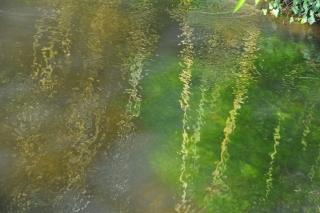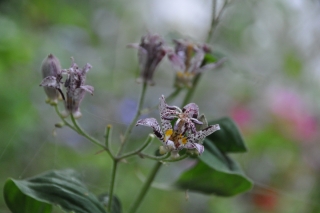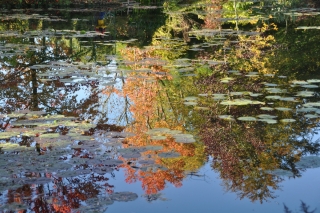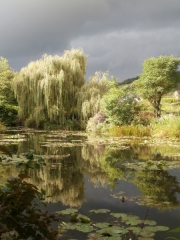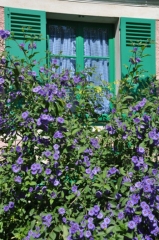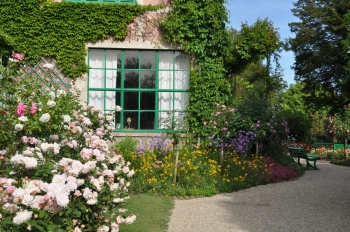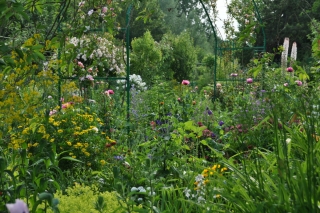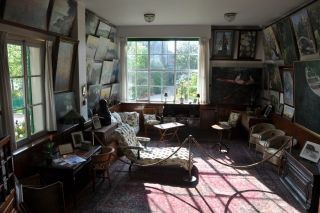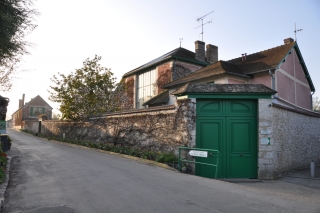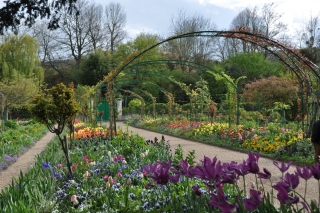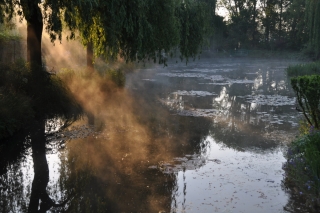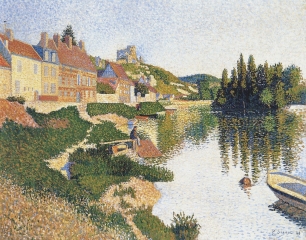December 31, 2013
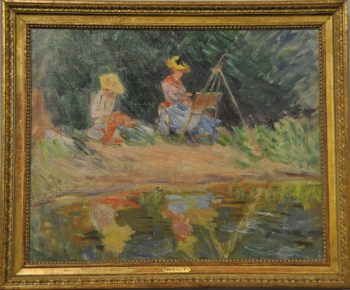 Here is a not so famous painting by Monet that was on display in a recent exhibit at the Musee de Louviers, not far from Giverny. This oil on canvas is privately owned.
Here is a not so famous painting by Monet that was on display in a recent exhibit at the Musee de Louviers, not far from Giverny. This oil on canvas is privately owned.
The title is “Blanche Painting with her Sister Suzanne on the Water Side”. It was painted in 1887 by Claude Monet.
Blanche was the daughter of Monet’s second wife Alice. She became his daughter-in-law by marrying Jean Monet, the painter’s eldest son.
Blanche was a talented artist. She often painted the same landscapes as Monet, in her own impressionist style, sometimes very similar to the style of the master.
Her sister Suzanne appears on numerous canvases, because she was a pretty young woman. Monet had her posing for his two attempts of a figure in open-air, aka as the girl with a parasol. (Musee d’Orsay, Paris)
Posted in Monet Painting 2 Comments »
December 9, 2013
The golden bamboos planted by Monet on the island of his water garden at Giverny reflect into the flowing water of the rivulet le Ru, producing ever changing broken lines.
Under the surface, the bright green of algaes.
A magnet for the eye…
(Click on the picture to enlarge.)
Posted in Giverny, Water-Garden No Comments »
November 17, 2013
The common name of this beautiful flower that grows in Monet’s water garden is a bit strange: it’s called toad lily.
The appearance of this perennial is more orchid like.
It requires a moist soil, as do toads, part shade under trees, and in these conditions it is very hardy.
The tricyrtis appears late in season.
This picture was taken in October.
Posted in Water-Garden, Flower No Comments »
November 9, 2013
On the 30th of October, the perfectly serene pool in Claude Monet’s garden offers a mirror view of the world around.
Blue sky and turning trees create a bold contrast between the still floating water lily pads.
(Click on the picture to enlarge).
Posted in Giverny, Water-Garden 1 Comment »
September 18, 2013
An unusual light on Monet’s water lily pond, while big dark clouds are loaming ahead… Just time enough to walk around the pound, and the drops will start to fall on the surface of the pool in hundreds of little circles.
Posted in Giverny, Water-Garden 2 Comments »
September 6, 2013
According to Claude Monet’s step son Jean-Pierre Hoschedé, the painter loved blue flowers.
This beautiful solanum, a plant belonging to the family of tomatoes and potatoes, is covered with simple little blue flowers.
It matches the colors of the kitchen window with its blue squared curtains, a very typical french pattern called vichy fabric.
In late Summer, plants are at the top of their heigth. With a bit of imagination, the flowers of the Giverny garden look like big waves splashing against the walls of the house.
Posted in Monet's House, Monet's flower garden No Comments »
August 29, 2013
The large window of Monet’s first studio at Giverny looks like an eye scrutinizing the flowers of the garden in order to paint them.
It opens onto the little rose garden, a corner that is rarely explored by the visitors of Giverny.
See two posts below the view from the inside, giving the illusion of a painting.
Posted in Giverny, Monet's House No Comments »
July 23, 2013
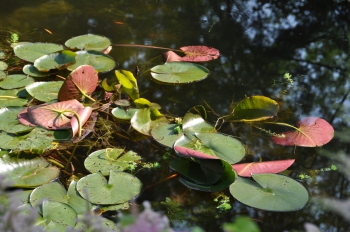 Water lily pads floating on Claude Monet’s pond at Giverny have a strange ability of changing their color. When they first pop they are purple, like the ones upside down on the pic. The sunlight turns them green. Claude Monet, who was a good observer of his garden, had noted these two colors. On some of his Nymphea paintings he made them green with a purple circle around.
Water lily pads floating on Claude Monet’s pond at Giverny have a strange ability of changing their color. When they first pop they are purple, like the ones upside down on the pic. The sunlight turns them green. Claude Monet, who was a good observer of his garden, had noted these two colors. On some of his Nymphea paintings he made them green with a purple circle around.
Posted in Water-Garden 2 Comments »
June 23, 2013
With the start of the Summer, flowers become a bit mad at Giverny.
They grow crazily in the garden of Claude Monet, enjoying the combination of mild weather and moisture typical for the Seine valley in this time of year.
Poppies, peonies, roses harmonize with eremurus, yellow sweet rocket or Canterbury bells in a charming way.
Wherever you look, you see waves and waves of flowers. No line interrupts them.
The secret of Claude Monet was to rise his flower beds slightly, in order to hide the path behind.
Posted in Monet's flower garden No Comments »
May 20, 2013
The first studio occupied by Claude Monet is part of his main house at Giverny. In this room, Monet stored the paintings he didn’t want to sell, to keep a record of the steps of his career.
Nowadays, the furniture is still authentic, as well as the objects decorating the room, but the paintings are all copies. Monet lined them on the walls on several rows up to the ceiling.
This studio was restored recently, it looks as if Monet had just left it.
Posted in Monet's House No Comments »
April 20, 2013
Monet’s property at Giverny is surrounded by high stone walls. This is nothing special in Normandy, as many estates and gardens are a so called ‘norman enclosure’, in French ‘Clos normand’. The walls are a good protection against rabbits and deers, and excellent for privacy.
Here is a pic of Monet’s second studio seen from the main street of Giverny, rue Claude Monet. This building is not open to the public. It houses offices and reception rooms for the administration of Fondation Claude Monet.
At Monet’s time, it was used as a studio where Monet stored the paintings for sale, and completed them if necessary. Monet designed the studio to receive northern light.
The big green gate was the gate to the garage sheltering his car, a Panhard Levassor that he bought in 1900.
On the far left, Claude Monet’s main house appears in the distance.
Posted in Monet's House 2 Comments »
March 26, 2013
After five months of Winter break,
Giverny will open again on Friday, 29th March instead of the traditional April 1st. This early opening is meant to welcome visitors on Easter week-end.
I’m thrilled to be back again soon in these magnificent gardens to share their beauty with you!
Photo: Giverny, April 20, 2012
Posted in Giverny through the seasons 9 Comments »
February 3, 2013
7:30 a.m. at Giverny, 4 May.
The sun appears behind the hill, enlightening the soft mist lingering over Monet’s pond.
The garden is quiet, peaceful.
Birds are singing the new day.
And light starts its magic on the surface of the water.
Posted in Giverny 3 Comments »
January 6, 2013
“Signac, the Colors of Water” is the title of the next exhibition at the Musee des Impressionnismes Giverny.
It will open on March 29, 2013 and display 120 works by the famous post-impressionist painter Paul Signac.
Signac is well-known for his pointillist, sometimes almost mosaic like paintings. He also loved watercolors for a quick sketch of a place, especially harbors.
Signac was a great admirer of Claude Monet. He stayed for the summer at Les Andelys, not far from Giverny, where Monet visited him and bought him a watercolor.
The Giverny exhibit includes a sumptuous view of the River Seine at Les Andelys belonging to Musée d’Orsay.
Posted in Impressionism Museum No Comments »
 Here is a not so famous painting by Monet that was on display in a recent exhibit at the Musee de Louviers, not far from Giverny. This oil on canvas is privately owned.
Here is a not so famous painting by Monet that was on display in a recent exhibit at the Musee de Louviers, not far from Giverny. This oil on canvas is privately owned.